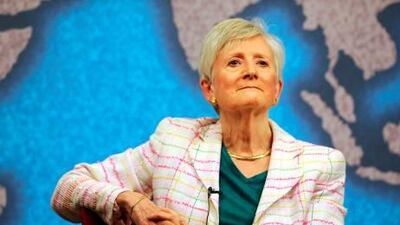ABU DHABI // Britain is keen to expand co-operation with the UAE geared at protecting against terrorist attacks, particularly those against aircraft, said the country's security minister.
Pauline Neville-Jones, the UK's minister for security and counter-terrorism, said the UAE's co-operation was crucial in foiling the international cargo bomb plots last October.
Gulf support for a no-fly zone over Libya was also crucial in the event of action by the international community against the regime of Col Muammar Qaddafi.
Security co-operation was part of a broader mandate to strengthen relations between the UAE and the UK, Baroness Neville-Jones said in an interview on Sunday.
"[British prime minister] David Cameron, when the coalition came into office, made it a very early priority … to upgrade the relationship between the UK and the UAE," she said.
The UAE had "one of the most important airports of the world, and aviation is a target for terrorists", she added.
Baroness Neville-Jones met Sheikh Saif bin Zayed, the Minister of Interior, Dr Anwar Gargash, the Minister of State for Foreign Affairs, and Sheikh Hazza bin Zayed, the National Security Adviser.
The UAE has tightened screening of cargo in its airports after bombs were discovered in cargo shipments from Yemen bound to the US aboard planes in England and Dubai in October.
"We are immensely grateful for the co-operation that we were given by the UAE, particularly Dubai, at the time of the cartridge printer bomb, which without that co-operation might have succeeded in its purpose of killing many people," said Baroness Neville-Jones.
"It was a very ingenious device. It shows the importance of having close co-operation combined with technological capability."
There were procedures and technologies that could be put in place to increase the safety and security of cargo, said Baroness Neville-Jones.
The UK wanted to monitor how the security equipment it sold was used, she said, but she expressed confidence in the policies of the region's governments.
"Any responsible country which is engaged in both defence and security needs to be careful about the purposes to which any of its equipment is put," she said. The minister said the UK was reviewing its policies dealing with extremism and radicalisation, saying the government would like to tighten legislation that was felt to be "unnecessarily onerous", such as "the power that the police used rather extensively to stop and search people without any visible cause".
"We're not deaf to some of the criticisms that have been made," she said.
UK policy would focus on promoting the integration of the country's large Muslim community, to deter Muslims from being attracted to extremist ideologies, she said.
"You need to have something positive for everyone to hold on to as an alternative, and to increase the sense that people have in the UK of being British, the nature of their identity and their shared values," she said. "We do believe in the strong desire among the vast number of Muslims that we have in the UK to want to do that."
The minister also praised the UAE's enactment of UN sanctions against Iran, saying it was necessary to prevent nuclear proliferation.
"We recognise that the UAE has paid a price in terms of trade in its willingness to enforce the sanctions, but we're extremely appreciative of the fact," she said.


